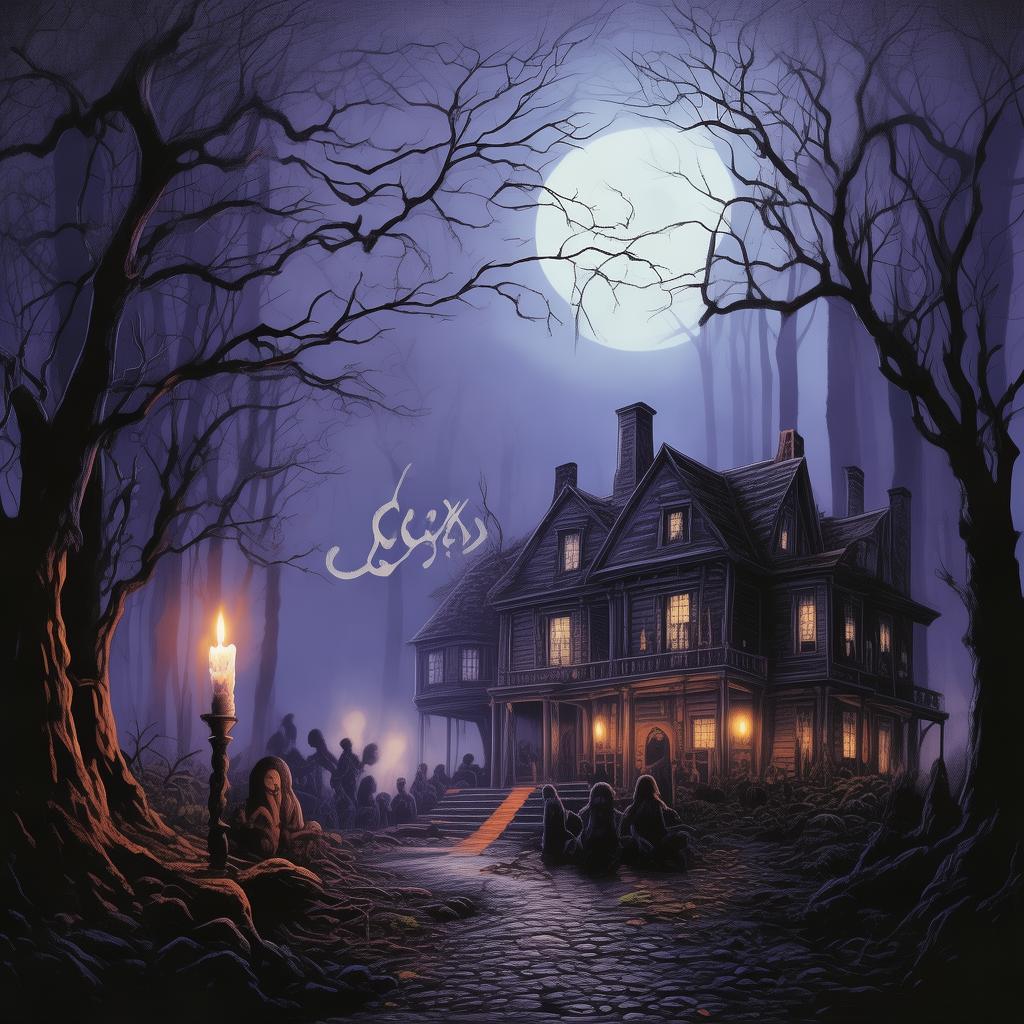The Sinister Symphony of Shadows
In the heart of an old, forgotten district, nestled between dilapidated factories and abandoned warehouses, stood a house that whispered tales of its own. It was known to the locals as the "House of Whispers," a place where the dead seemed to linger, and the living dared not venture. Its windows were always boarded up, and the door, a massive oak, seemed to be carved from the very heart of darkness itself.
Eliza, a young and ambitious artist, had recently lost her studio to a fire. Desperate for a place to work and a fresh start, she had heard whispers about the House of Whispers. The stories of its previous inhabitant, a tormented composer who had vanished without a trace, had intrigued her. She saw it as an opportunity to immerse herself in her art, a place where creativity would be unbound.
The first night in her new studio, Eliza felt an unsettling presence. She dismissed it as the residual energy of the house, a normal part of living in such a place. But as the days passed, she noticed strange occurrences. Her paints would sometimes move on their own, and her music would play when no one was near. It was as if the house was alive, watching her every move.
Eliza's best friend, Sarah, came to visit one evening. "You okay, Eliza? I've been worried about you," she asked, her voice tinged with concern.
Eliza nodded, though her mind was elsewhere. "I'm fine, Sarah. It's just... the house. It's... different."
Sarah's eyes widened. "Different how? I heard the stories about this place. Are you seeing anything?"
Eliza hesitated. "I think the house is... talking to me. It's like it's trying to tell me something."
Sarah chuckled nervously. "That's a bit much, Eliza. Maybe you need to take a break."
But Eliza couldn't shake the feeling that something was amiss. She began to notice strange patterns in the house's behavior. Her studio door would open and close at random times, and the air would seem to hum with an eerie, almost musical quality. It was then that she realized the house was playing a symphony of shadows.
One evening, as Eliza worked late, she heard a faint melody. She paused, straining to listen. The music grew louder, more haunting, until it filled the room. It was the same composition she had been working on, but with a sinister twist. She had never composed anything so dark and twisted, yet it felt as if it had always been part of her.
Desperate to understand the source of this music, Eliza began to explore the house. She found old sheet music scattered throughout, each page filled with intricate notes and strange symbols. She recognized the composition, the one she had been working on. But these pages were not her work; they were from the composer who had once lived here.
Eliza's mind raced. The composer had vanished, and now his music was haunting her. She delved deeper into the house's history, learning about the composer's life, his obsession with creating the perfect symphony. It was said that he had become so consumed by his art that he had begun to hear voices, voices that guided his hands to write the music.
As Eliza pieced together the composer's story, she realized that the house was not just a place of haunting but a place of manipulation. The composer had been driven to madness by his own creation, and now, it seemed, the house was using Eliza in a similar fashion.
One night, as the music reached a crescendo, Eliza followed the sound to the attic. There, in the dim light, she saw the composer's body, preserved in a glass case. His eyes were open, and it was clear that he was still alive, trapped within the confines of the house.
"Who are you?" Eliza whispered, her voice trembling.
The composer's eyes flickered open. "I am the music, the symphony of shadows. You have heard my voice, and now you must choose. Will you let me finish my work, or will you end it?"
Eliza felt a chill run down her spine. She knew that she had to make a choice, but she didn't know what the consequences would be. She looked at the composer, his face twisted with pain and determination, and she knew that she had to do something.

With a deep breath, Eliza reached into her pocket and pulled out a pair of scissors. She walked over to the glass case and cut a small hole in it. The composer's eyes widened in shock.
"You can't stop me," he hissed.
Eliza smiled, though it was a cold, hard smile. "I can stop you from haunting me, and from anyone else who might come after me."
With that, she cut the glass open, and the composer's body slumped forward, his eyes closing for the last time. The music stopped, and the house was silent.
Eliza left the house that night, the symphony of shadows behind her. She had made her choice, and she had survived. But she knew that the house would always be there, waiting for the next artist to come along, and the cycle would continue.
The Sinister Symphony of Shadows was not just a haunted house story; it was a tale of psychological manipulation and the battle between creativity and madness. Eliza's journey had left her forever changed, but she had emerged victorious, at least for now.
✨ Original Statement ✨
All articles published on this website (including but not limited to text, images, videos, and other content) are original or authorized for reposting and are protected by relevant laws. Without the explicit written permission of this website, no individual or organization may copy, modify, repost, or use the content for commercial purposes.
If you need to quote or cooperate, please contact this site for authorization. We reserve the right to pursue legal responsibility for any unauthorized use.
Hereby declared.









